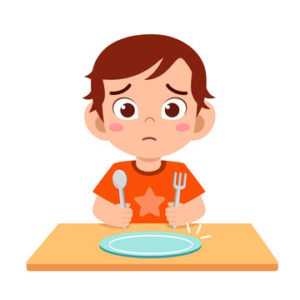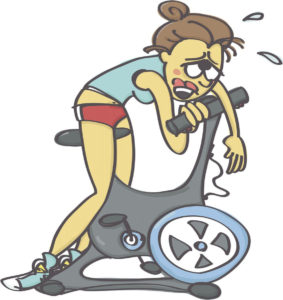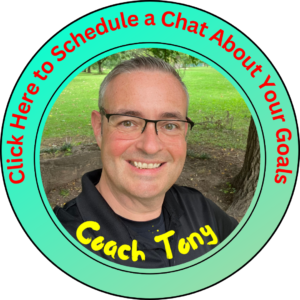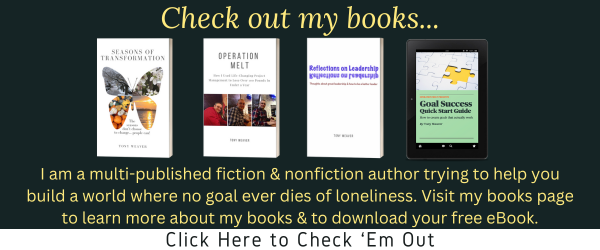In Ask Coach Tony, you can put my Operation Melt coaching to the test by asking me questions about how to achieve your goals. Go ahead, ask me anything!
Are you ready for a dad joke? I offer you this "dad joke" as a light "amuse-bouche" to entertain your mind before we get serious. My dad joke may be groan-worthy, but it's worth every penny you paid for it, right? Most people think that t-rexes can't clap because they have short arms, but it's really because they are dead.
New Year, New You? Avoid These 3 Weight Loss Mistakes – Part 3
Here we go… we are starting the final week of January. Multiple studies have concluded that 95% of New Year’s resolutions will be dead by the end of this week. Since most resolutions focus on health, fitness and weight loss, many people (too many) will have given up on their health goals for another year.

It doesn’t have to be this way!
By shining a light on three of the biggest mistakes people make with weight loss, I hope to help you conquer or avoid these mistakes so you make your journey successful. But it’s bigger than that… as I have said for the past few weeks, these are the same mistakes that torpedo your non-weight-loss goals.
Before jumping into the final installment of this three-part series, let’s review what I have shared so far:
- Avoid autopilot in your life: autopilot is the number one killer of goals; this is especially true for weight loss and fitness goals.
- Build a plan that works for you: a quick shortcut to goal failure is following someone else’s plan without considering whether it will work for you.
The final mistake I am sharing today is a biggie; it’s one that I have frequently made (and continue to do so). This mistake is so common with high-achievers that it should probably be called “high-achiever’s syndrome.”

Warning: you may feel like I am calling you out directly… I am not. You’re just not alone in making this mistake.
When being a high-achiever backfires on you, it could cost you your goal.
Weight Loss Mistake #3: High-Achiever’s Syndrome
Do any of these scenarios feel familiar?
Person 1 wants to lose weight. In talking with their doctor, they have learned that their TDEE (approximate number of calories their body burns each day) is around 2500 calories. The doctor recommends reducing their calorie intake to slightly less than their burn (a “calorie deficit”) to achieve a safe weight loss. This is a pretty standard scenario, right?
Enter “high-achiever’s syndrome” … person 1 is a high-achiever and wants to “win” at weight loss. Instead of a safe 300-500 calorie deficit, they decide to eat just 1200 calories daily.

What do you think happens?
Here’s another scenario. Person 2 has been living a sedentary lifestyle and getting almost no daily exercise. They work with their doctor to start a weight loss journey, and the doctor suggests getting more exercise. Based on the CDC recommendation, the doctor recommends getting 150 minutes of moderate-intensity physical activity and 2 days of muscle strengthening per week.
What do you think person 2, a high-achiever, does?
Person 2 decides they can do better than the doctor’s recommendations. Instead of getting 150 minutes of weekly exercise, they start running every day for 30 minutes or more with an additional 5 miles of walking. On top of this, they start lifting weights for 30 minutes per day, five days per week.

Do you think person 2 will be successful with their weight loss?
The story of person 3, who experienced high-achiever’s syndrome when trying to save money, is best left untold!
High-achievers want to “win” their battle with their goal. They often believe more is more and overdo it when pursuing a goal… their results are usually not what they hoped.
Hey! What’s Wrong With Being A High-Achiever?!
There is nothing inherently wrong with being a high-achiever. I am one, and most of the clients I support are too. But, as high-achievers, we all need to be self-aware and control our more self-sabotaging tendencies.
For example, for person 1 above, their excessively low calorie consumption may be unhealthy for their body. Further, it may cause a metabolic issue where their body enters starvation mode, where self-preservation is its top priority. When this happens, their body will attempt to conserve every calorie they consume because it isn’t sure it will get more food. This could result in under-nourishment and weight gain, counterproductive to their goal.
For person 2, their over-aggressive exercise routine may take a big toll on their body. Without sufficient recovery time, the load from every workout is layered on top of an already exhausted body. Over time, their performance will suffer, and injuries will become more likely. An injury could sideline their workouts and, again, be counterproductive to their goals.

Even without the metabolic syndrome and the injuries, the high-achiever syndrome can result in a decreased quality of life. Person 1 and 2 both had goals of improving their life through weight loss but are now under-eating and over-exercising. This may lead to burnout or general unhappiness with their journey. Such feelings can make their journey unsustainable and torpedo their goals.
I recently heard the quote, “Anything overused will start to hurt.” This is the perfect description of the situation you face when you fall victim to high-achiever’s syndrome.
As a high-achiever, you are more likely to overdo it when pursuing your goals. This could put your goal at risk or jeopardize your happiness and quality of life.
Keeping It In Check
So, how do you keep high-achiever’s syndrome in check?
I wish there was some magic strategy, formula or hack to keep it at bay, but it’s not that simple.
Controlling your high-achiever’s syndrome requires you to master your mindset… which will be a challenge. This challenge will require you to remind yourself that this isn’t a competition with anybody. There is nobody who will give you a gold star or an attaboy for getting to the finish line faster. In fact, trying to get to the finish line faster may actually cause you harm.

How do you change your mindset? It requires proactive and ongoing reminders of the new beliefs you are trying to focus on to prevent autopiloting yourself back to old behaviors. This is a job for our old friend, affirmations.
Take a minute and write yourself a note to remind yourself of the things you need to remember to keep high-achiever’s syndrome in check:
- I am not competing with anybody
- This is not a race
- Slow progress is good progress
- This is a marathon, not a sprint
- I trust the process
- I am proud of my progress
Place these reminders in multiple locations, including on your bathroom mirror, at your desk, and in other places where you will see them throughout the day. Read these statements every morning to help proactively manage your mindset. Reread your affirmations when tempted to unleash your high-achiever tendencies on your weight loss goal.
Affirmations work because they allow you to intentionally reset your inner dialogue and substitute your desired thoughts for the ones that aren’t serving you. I know the concept of affirmations may be a little woo-woo for your left-brained tendencies, but there is proven neuroscience to back it up. This isn’t astrology.
Using affirmations to manage your mindset is the best first step to keeping your high-achiever’s syndrome in check.
Is your weight loss goal important to you, or is it just a “someday, maybe” goal? If it is truly important, you have choices: keep trying things that have failed in the past or avoid those past mistakes. If you want to make this time different, avoid the big three mistakes. You can achieve this by:
- Avoiding autopilot and be deliberate with your health and fitness
- Build a plan that works for you, not somebody else
- Proactively manage your mindset to prevent the high-achiever’s syndrome
By employing these three strategies, you’ll be far more likely to achieve your weight loss or any other goal. If you need a little help, I also recommend adding a fourth strategy: work with a coach to help you build and stick to your plan. I am a Master Life Coach, and I would be happy to help. You don’t have to do it alone.
I believe in you and want to help YOU believe in you!
Meet Coach Tony
My name is Coach Tony, and I am a coach, author and project manager on a mission. I am working to build a world where no goal ever dies of loneliness.
I almost allowed one of my biggest life goals to die without ever being attempted for forty years. My goal almost died, not of failure but of loneliness. But, I took a risk and leveraged a simple, logical process that helped me wildly exceed my goal.
I transformed my life, and you can do the same with the help of Operation Melt.
Operation Melt provides engaging, practical content and hands-on coaching to inspire, motivate and equip project managers and other left-brained high-achievers to pursue and accomplish their biggest goals.
Breathe new life into your goals
Download my free ebook to learn how to create goals that actually work and get the jump-start you need in life!




